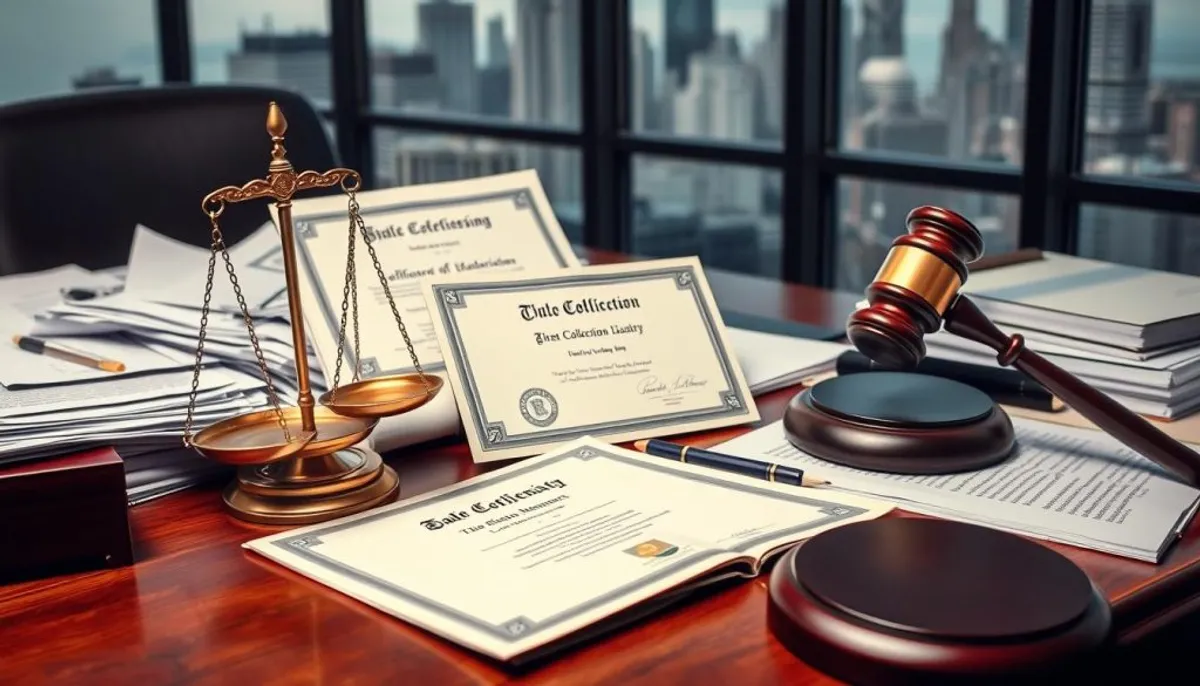Unpaid bills can significantly impact your company’s financial health. Engaging a collection agency is often a strategic choice to rectify this issue. This guide will navigate you through the essential aspects of selecting a reliable agency for your debt recovery needs.
Choosing the right collection agency is paramount. It should align with your business objectives. The ideal partner can enhance your cash flow and allocate more resources to your core activities. We will explore the critical considerations for collaborating with collection specialists.

Collection agencies possess specialized tools and methodologies. They frequently outperform in-house efforts, achieving higher success rates. Their contingency-based model means you only incur costs when they successfully collect. This model is highly beneficial for many enterprises, as it is cost-effective.
Are you prepared to identify the most suitable agency for your business? We will discuss how to assess agencies, comprehend fee structures, and adhere to legal standards. By the conclusion, you will be well-informed to select a collection agency that propels your business forward.
Collection agencies are pivotal in aiding businesses in retrieving unpaid debts. They are equipped with the knowledge and adhere to the necessary licensing requirements. Their main objective is to collect outstanding invoices, thus enabling companies to concentrate on their primary activities.
When debts exceed 90 days, businesses frequently seek the assistance of collection agencies. These entities charge a percentage of the recovered sum, typically ranging from 25% to 50%. This fee structure motivates them to maximize their collection efforts.
Collection agencies employ diverse strategies to reclaim debts. They may engage in negotiations to settle for less than the full amount or even acquire the debt outright. This method is advantageous for businesses facing financial constraints.
It is crucial to acknowledge that debt collection practices are subject to regulation. The Fair Debt Collection Practices Act prohibits aggressive tactics and establishes standards for collector conduct. This ensures that while agencies strive to collect debts, they operate within legal and ethical frameworks.
Traditional debt collection methods often fail to meet the evolving needs of businesses. As companies expand and debts become more intricate, these outdated methods can impede recovery efforts. This can negatively affect a company’s overall financial health.
Many businesses attempt to manage debt collection internally, yet face significant hurdles. Staff may not possess the specialized training required for effective debt recovery. Without the right tools and knowledge, internal teams find it challenging to engage with debtors and secure successful repayments.
Debt collection is a time-consuming endeavor that can divert resources from core business activities. Employees tasked with collection duties may overlook other critical responsibilities. This diversion can erode productivity and profitability across the organization.
Poorly executed debt collection efforts can severely damage customer relationships. Aggressive or insensitive approaches can alienate customers, complicating future interactions. This underscores the need to evaluate collection agencies that prioritize customer-centric strategies.
Recognizing these limitations enables businesses to make informed choices when evaluating collection agencies. Professional agencies bring specialized skills, compliance expertise, and cutting-edge technology. These assets are crucial for overcoming the challenges posed by traditional debt collection methods.
Engaging a collection agency is a pivotal move for businesses facing unpaid debts. This process demands a meticulous evaluation of your specific requirements and a thorough assessment of potential agencies. We will dissect the essential steps to identify the most suitable agency for your enterprise.
Before embarking on the search for a collection agency, it is imperative to grasp your unique requirements. Reflect on the types of debts you aim to recover, their age, and your desired resolution. This foundational understanding will guide you in selecting an agency adept in addressing your specific challenges.
Having clarified your needs, initiate your research into potential agencies. Seek out entities with a background in your sector and a history of successful recoveries. Examine online testimonials, industry affiliations, and solicit endorsements from peers within your professional circle.
In scrutinizing collection agencies, attention to their credentials is paramount. Verify their licensure, insurance, and adherence to regulatory standards. Agencies of repute should possess Errors and Omissions Insurance, safeguarding against legal liabilities.
Having refined your options, the time has come to make your definitive choice. Solicit proposals from your leading contenders and compare their offerings, pricing, and collection methodologies. It is crucial to meticulously review any proposed contracts before committing.
Recall, the selection of a proficient collection agency can profoundly influence your business’s fiscal well-being. Allocate sufficient time to discover an agency that resonates with your ethos and is capable of achieving the desired outcomes.
Choosing a collection agency necessitates a thorough examination of their qualifications and licensing. The licensing requirements for collection agencies differ across states, underscoring the importance of understanding local laws and regulations. The Association of Credit and Collections Professionals (ACA) offers state-specific guidance to facilitate this process.
A reputable agency must hold a valid license, be bonded, and carry insurance. These measures safeguard your business against potential liabilities. Notably, Errors & Omissions (E&O) insurance is crucial in this field.

Compliance with federal regulations is non-negotiable. It is imperative that the agency follows the Fair Debt Collection Practices Act (FDCPA). For those involved in medical debt collection, HIPAA certification is mandatory. These standards protect both your business and your clients.
It’s crucial to remember that a qualified agency with the right licensing not only ensures legal compliance but also typically yields superior results. They are well-equipped to manage complex cases and uphold professional standards throughout the collection process.
Understanding collection agency fees is essential when outsourcing collections. Agencies present various payment models to cater to diverse business requirements. Let’s examine the primary options available.
Contingency fees are the prevalent model. Agencies charge a percentage of the debt collected, usually between 15% and 33%. This fee structure motivates agencies to maximize debt recovery. For debts that are significantly overdue, fees may escalate due to the increased complexity of collection.
Flat rate services are available, mainly for commercial collections. These rates span from $10 to $25 per account, irrespective of the debt’s size or age. This model ensures consistent costs for businesses with numerous small debts.
In this arrangement, the agency purchases the debt at a discounted rate. While this model guarantees immediate payment, the amount received is typically less than the original debt’s value.
When selecting a payment model, assess your debt profile, cash flow requirements, and risk appetite. It’s important to note that collection agencies can be more economical than in-house departments. They offer specialized knowledge and advanced technologies for effective debt recovery.
When assessing collection agencies, it is imperative to identify a reputable entity with the appropriate experience and expertise. This entails a meticulous evaluation of several critical factors.
Seek agencies with a proven track record in your industry. Such experience ensures they comprehend the unique hurdles you encounter. For instance, in healthcare collections, some agencies have over 125 years of experience.
Analyze the agency’s historical performance. Success rates fluctuate with account complexity. A high success rate signifies their proficiency in debt recovery.
Obtain client references to assess client satisfaction. Consult the Better Business Bureau and Commercial Collection Agency Association for credible agencies.
It is noteworthy that 82% of businesses struggle with late payments. Selecting the correct collection agency can substantially enhance your cash flow management.
In today’s digital era, debt recovery services have undergone a significant transformation. Modern collection agencies employ advanced technologies to refine their methods and enhance success rates. It is essential to understand the technological capabilities that can bolster debt recovery efforts when reviewing collection agency contracts.
Advanced skip tracing tools empower agencies to pinpoint debtors who have relocated or altered their contact details. This innovation significantly elevates the likelihood of successful debt recovery. Agencies also tap into comprehensive databases, gaining access to crucial information that facilitates more effective communication strategies.
Automated systems are integral to streamlining debt collection processes. These systems efficiently manage account tracking, report generation, and communication workflows. Many agencies now provide client portals or dashboards, offering real-time access to collection activities and account details. This level of transparency enables businesses to remain informed and make decisions based on data.
AI-powered solutions have transformed debt recovery services. For example, AI-driven phone calls can slash operational costs by 60% while increasing collection rates by 17% through tailored reminders. Automated voicebots also enhance customer compliance with payment deadlines, leading to enhanced success rates.
When assessing collection agency contracts, prioritize those that leverage these modern technologies. Their advanced capabilities can substantially enhance debt recovery outcomes while preserving positive customer relationships.
Understanding collection laws and regulations is essential when hiring a collection agency. The debt collection industry, employing numerous individuals, operates under strict guidelines to safeguard consumers. Agencies must comply with the Fair Debt Collection Practices Act and state-specific rules.
The FDCPA establishes standards for ethical debt collection practices. It prohibits harassment, false statements, and unfair practices. Agencies must provide written notice of the debt and respect consumers’ rights to dispute or request verification.
Each state has its own collection laws. For instance, in California, debt collectors must pay a $350 application fee and a $150 investigation fee per applicant. They have 90 days to complete fingerprinting and background checks after receiving conditional approval.
Collection agencies handle sensitive financial information, making data protection crucial. They must comply with privacy laws to safeguard consumer data from breaches or unauthorized access.

Collection agencies invest in specialized technology and trained staff to ensure compliance with consumer protection laws. By adhering to these regulations, agencies maintain ethical debt collection practices while protecting your business from legal issues.
In the evaluation of collection agencies, the establishment of clear communication protocols is paramount. This facilitates seamless collaboration and ensures the effective monitoring of collection endeavors. Leading agencies provide a variety of reporting options, ensuring clients remain abreast of their account progress.
Collection agency contracts typically detail communication frequency and reporting methodologies. Some agencies offer weekly updates, while others provide monthly or quarterly reports. Many contemporary collection firms now enable real-time access to collection activities via secure online portals.
When selecting an agency, consider these reporting options:
Identifying your primary point of contact at the agency is crucial. This individual will be accountable for addressing your concerns and providing updates on collection progress. Establishing clear communication channels ensures transparency and allows for effective management of the collection process.
Effective communication is essential for successful debt recovery. When assessing collection agencies, prioritize those with robust reporting systems and responsive communication protocols. This ensures you remain informed and can make data-driven decisions regarding your accounts receivable management strategy.
In today’s business environment, late payments pose a significant hurdle. With 89% of small-to-medium-sized enterprises facing growth constraints due to delayed payments, the need for effective debt recovery services is paramount. ti3 emerges as a pioneering SaaS platform, poised to transform the landscape of outsourcing collections.
ti3 introduces a revolutionary approach to debt collection through automation. It initiates timely reminders and escalates issues when necessary, ensuring seamless payment collection from delinquent customers. Given that only 38% of invoices are paid on time, this automated strategy can substantially enhance cash flow.
Unlike conventional collection methods that can jeopardize customer relationships, ti3 adopts a professional and courteous demeanor. This is crucial, as 25% of small businesses are at risk of closure due to payment issues. ti3’s system ensures the preservation of valuable client connections while efficiently managing overdue accounts.
Small businesses typically spend around £5,000 annually on late payment recovery efforts. ti3 presents a more economical solution compared to traditional debt collection agencies. By automating the process, it significantly reduces the 14 hours weekly that 65% of businesses dedicate to payment-related administrative tasks.
By embracing ti3, businesses can streamline their debt recovery services, foster positive client relationships, and bolster their financial performance. This can be achieved without the reliance on traditional collection agencies.
When crafting collection agency contracts, it’s imperative to focus on risk management and insurance. This step is essential to safeguard your business and uphold ethical debt collection standards. A critical element is ensuring the agency has Errors & Omissions (E&O) insurance.
E&O insurance is a cornerstone in shielding your business from potential liabilities. It’s crucial in mitigating risks tied to debt collection. Your contract must explicitly detail liability and indemnification clauses to safeguard your interests.
Engage in discussions with the agency about risk management strategies. Emphasize their approach to handling sensitive data, preventing data breaches, and navigating legal hurdles. Remember, the Fair Debt Collection Practices Act (FDCPA) prohibits collectors from engaging in abusive, unfair, or deceptive practices.
By incorporating these elements into your contracts, you lay a strong foundation for responsible and effective debt recovery. This strategy not only shields your business but also ensures adherence to industry standards and regulations.
Understanding the process of hiring a collection agency is essential for businesses aiming to enhance their debt recovery strategies. This involves a thorough assessment of agencies based on their experience, adherence to legal standards, and technological capabilities. Opting for a suitable partner can greatly benefit your financial standing and optimize your debt collection processes.
In the selection of a collection agency, it is vital to consider their specialized knowledge, success rates, and testimonials from previous clients. Options like ti3 present automated solutions for payment recovery, which can maintain client relationships while being cost-effective. These alternatives are designed to streamline the debt collection process.
The objective extends beyond mere debt recovery; it encompasses doing so in an ethical and respectful manner. Seek agencies that uphold legal compliance, foster open communication, and leverage cutting-edge technology. Adhering to these criteria will enable you to identify a collection agency that meets your business’s specific requirements and ethical standards.